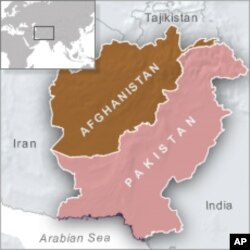As donor nations at an international conference in Kabul mulled over Afghanistan's future course, there were also signs of a warming in the sometimes frosty relationship between the Afghan and Pakistani governments. But it remains to be seen how long the thaw will last.
For years, Afghanistan and Pakistan have not been particularly good neighbors. Afghan President Hamid Karzai has routinely accused Pakistani intelligence of sheltering and aiding radical militants who crossed the border to mount attacks inside Afghanistan. Pakistan has denied the charge.
But relations seemed to warm up this year. President Karzai and Pakistani Prime Minister Yousaf Raza Gilani met in Islamabad in March for a show of reconciliation. Then on July 18, the two countries signed, under U.S. prodding, a rare trade agreement, the first such bilateral pact since the 1960s. One U.S. official labeled it a big deal.
What accounts for the thaw?
Former deputy assistant secretary of state for South Asia Teresita Schaffer says President Karzai looked at a calendar and saw 2011, the date by which President Obama has said U.S. troops might begin to leave Afghanistan, if conditions permit.
"I think that, for all kinds of reasons, [Mr.] Karzai has concluded that it is in his interest to work more closely with the Pakistanis, and, I think, this is very much influenced by the 2011 date," said Schaffer. "However, these periods of closeness with Pakistan and Afghanistan have always been interrupted by Afghans acting like Afghans, and deciding that they're tired of being manipulated and turning on their Pakistani brothers."
Keeping influence in Afghanistan has long been a centerpiece of Pakistan strategic doctrine. Under this tenet, Islamabad must maintain a toehold in Afghanistan in order to counter any influence from India.
And, analysts say, India has been ratcheting up its diplomatic and economic influence in Afghanistan, much to Pakistan's consternation.
Professor Christine Fair of Georgetown University, who is on an extended trip to Pakistan, says India is also looking at the calendar, knowing it can keep trying to extend its reach in Afghanistan only for so long - and that Pakistan is watching India.
"There's this whole issue of how India plays its cards. Now, they're basically free-riding under the American security umbrella," she said. "So, in India, there's a big debate on what they're going to do when the Americans pull out [of Afghanistan], because they India] obviously can't do what they're doing without the American security umbrella. So, the problem is, this is a multi-player game, and they're all hedging against what they think each other is doing," said Fair.
The U.S. is pleased with the warming Afghan-Pakistani relationship as something that will make its diplomatic and military life a little easier. Washington has been walking a tightrope as it tries to simultaneously fight an insurgency in Afghanistan, prop up a shaky but corrupt government in Kabul, and prod a sometime reluctant Pakistani government to get tough with militants operating from its soil.
But there are some quarters in Afghanistan, analysts say, that are unhappy over the rapprochement between Islamabad and Kabul. Former EU Special Representative to Afghanistan Francesc Vendrell says Afghanistan's ethnic minorities are worried that the thaw strengthens the power of President Karzai and his fellow ethnic Pashtuns. And, he adds, some Pashtuns may not be particularly happy about it either.
"I think the non-Pashtuns, and a good number of Pashtuns, are very upset about it. They wouldn't want to see a deal cut that would reduce their influence, the non-Pashtun influence, in the government. And, I think, a lot of Pashtuns also are very anti-Pakistani. And, we'll see how long this courtship lasts," said Vendrell.
Analysts warn that, given the stormy history between Afghanistan and Pakistan, the thaw in relations could be broken by a repeat of the events of 2008, when suicide bombers twice attacked the Indian Embassy in Kabul. The Taliban claimed responsibility, but the Afghan government implicitly blamed Pakistan, saying it was the work of a foreign state.
